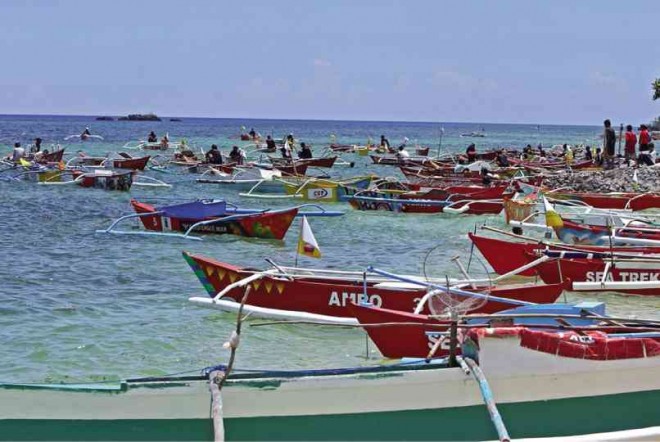
MANY survivors of Yolanda are not begging for aid, only for the means to return to work, which some foundations answered through donations of fishing boats like these for fishermen who lost their boats. LITO TECSON/CDN FILE PHOTO
TACLOBAN CITY, Philippines – “I am thankful for others who were given boats so they can return to their livelihood as fishermen. Even if I was not given a boat, I am thankful because I now see they are happy.”
This were the simple words of Pablo Dacono, 35, a fisherman from Barangay (village) Bolusao, Lawaan Municipality, Eastern Samar whose fishing boat was destroyed by Supertyphoon “Yolanda” (international name: Haiyan) nearly a year ago.
“I am happy they are able to go out to sea and continue their livelihood. Even if I can’t do the same, I am happy because our village is able to rise again, even by just a little, thanks to the many Non-Government Organizations (NGOs),” he said in Filipino in an interview Wednesday.
Dacono and his wife and two children, ages nine and six, are the recipients of Plan International’s transitional shelter building program. Local residents in the barangay were trained in carpentry skills under the Technical Education Skills Development Authority (Tesda) which they then apply in the building of shelters.
Before they became the beneficiaries of Plan’s shelter assistance program, Dacono said that they had to live for four months under a makeshift hut he made out of scrap roofing and wood he found amid all the debris.
Asked whether he felt things were back to normal, he said, “Things seem to be returning to normal slowly. Just a bit but not yet fully.”
Before Yolanda struck, Dacono said he could make around P150 from fishing and around P500 from harvesting and selling copra, or dried coconut kernel, that yields coconut oil.
“[With fishing] it depends because if I don’t catch anything, I will try harder to catch something so that I can bring home some food or make a profit by selling the catch,” Dacano said.
“The coconut farm is far away, about a two-hour walk to the mountainside and another two-hour walk back. I can only earn if there are a lot of coconuts. Copra can be sold in Tacloban for around P500. But with additional expenses in fares, only a little money is left for myself,” he said.
But after Yolanda destroyed wide areas of coconut plantations and his boat, he is left with no other means livelihood.
“Life is really hard here. Most of the people have no means of livelihood other than the plantations on the mountain or the sea,” Dacano said.
He, however, pointed out that they have managed to stock rice and several other food items from relief goods distribute by government agencies as well as NGOs.
Even the needs of his children for school such as pencils, notebooks, and bags have been met, reducing the need to buy them.
Asked what his dreams and ambitions were before Yolanda, Dacano simply said “to give my family a decent living.”
“But when Yolanda’s deluge came, it washed away everything, including my livelihood,” he said.
Would he dare to dream and aspire again a year after Yolanda?
“I will have to think about it,” Dacano said with a sheepish smile. “I cannot bear if my children would not be able to finish their schooling [because of lack of money].”
Dacano recounted how he had to stop college when he was on his way to become a seaman. Something he does not want to happen to his eight-year-old son who looks up to him.
“My daughter wants to become a doctor. My wife and I give her the support she needs, we let her dream,” Dacano said.
“My son wants to be like me because that’s what he sees. But I tell him to not be like me and focus on his studies because his schooling will be the best treasure I can leave with him once I am old,” he said.
RELATED STORIES
After ‘Yolanda,’ ‘mother leaders’ help communities get ‘clean’
Gov’t too slow? ‘Yolanda’ victims rebuilding on their own